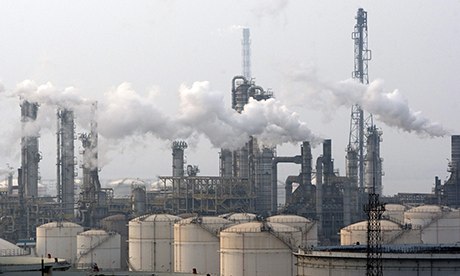
For the last decade, the energy industry has been convinced that demand for oil, gas and coal will keep growing quickly for the next 20 years; oil prices will remain high, and China will continue to build two coal power stations a week. The profits for oil and mining companies will keep flooding in.
The investment community has largely accepted this view and backed companies' investment of hundreds of billions of dollars a year in finding and developing new reserves.
Of course, rampant growth in demand for coal and oil is depressing for those worried about climate change. If this demand growth continues, it seems unlikely that we can avoid dangerous climate change. But what if the energy industry's bullish forecasts are wrong? In the past 12 months a counter argument has been gaining momentum in the investment community.
The side of this story that has captured the imagination focuses on "carbon bubbles", as experts argue that there is already more carbon embedded in the reserves of the fossil fuel companies than the world can burn if we are going to keep below a 2-degree temperature rise. These reserves may be "unburnable" and company share prices may be overinflated. The latest warning came a few days ago from Al Gore.
But there is an even more urgent story to tell: demand for coal in the US has fallen by 20% or so over the past five years. New air pollution regulations are making coal increasingly expensive, so power companies are burning cheap shale gas instead. US carbon emissions are also down – to levels last seen in the mid-1990s.
In Europe, too, coal demand is set to fall, as similar environmental regulations force the closure of many coal power stations over the next 15 years. This is already having a huge impact on investors' holdings in this sector, with the share prices of some coal mining companies down 75% or more over two years.
The trend for oil is similar, if less dramatic. Tough new fuel efficiency standards mean demand for oil is falling in rich countries – and the oil industry itself accepts that this drop is set to continue.
The great salvation for the fossil fuel industry is supposed to be the anticipated vast growth in demand from China and other emerging economies – more than making up for declines elsewhere.
But there has been a steady flow of investment analysis predicting much lower growth for China. These analysts are pointing to a worrying credit bubble, overinvestment and difficult economic rebalancing, which they say indicates the strong possibility that growth could fall dramatically. There is even talk of a "lost decade".
Bad economic news in China and other emerging economies would remove the last big source of future growth for fossil fuels. Major investment research firms like Citi and Bernstein are suggesting that, as a result, demand for oil and coal could peak within a few years and then enter a long, slow decline.
This raises big questions about the profitability of new capital investments by fossil fuel companies. Investors are already hurt by share price declines in the mining sector and disappointed by the performance of many of the big oil companies. They are concerned that capital expenditure levels are too high. The possibility that oil and coal demand may fall only adds to the risks for investors – investors who manage the pensions and savings of many millions of people.
As a result, the Institutional Investors Group on Climate Change, representing more than 85 European investors and pension funds with €7.3tn of assets, is co-ordinating a discussion between some of Europe's biggest investors and the oil and mining companies in which they have invested. This is part of a wider global initiative that has been coordinated with US and Australian investors.
The investors are asking companies like Shell, BP, Total, Rio Tinto and Anglo American about their exposure to the risks of falling demand and their strategies for responding to this risk.
The early responses are surprisingly positive. Some companies are saying that they have been changing their priorities. Instead of emphasising investment in growth, some oil companies are taking a more cautious approach, emphasising investment in less risky assets like low cost oil and natural gas reserves.
In the mining sector, the change is much more dramatic. Many mining companies are halting investment in new coal mines altogether, and even selling their coal assets.
It's hard to predict the future. Climate policy may not accelerate as fast as many hope. China might escape the economic crisis some are predicting. And fossil fuel demand may yet keep rising – despite the horrendous climate consequences. But one message comes across loud and clear: hydrocarbon demand is unusually uncertain and this places risk firmly on the investment agenda.
Craig Mackenzie is head of sustainability at the Scottish Widows Investment Partnership and Stephanie Pfeifer is the chief executive of the Institutional Investors Group on Climate Change
Join the community of sustainability professionals and experts. Become a GSB member to get more stories like this direct to your inbox

